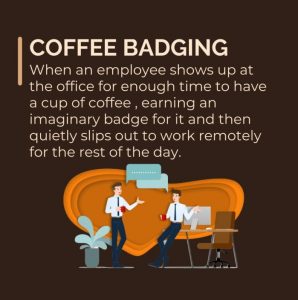Coffee Badging: A Symptom, Not the Disease

The way we work has undergone a dramatic shift. Gone are the days of strict office routines, with many employees now embracing flexible work arrangements. However, this newfound freedom has sparked a new trend: “coffee badging.”
What is Coffee Badging?
Coffee badging involves employees swiping into the office, grabbing a coffee, and then heading home to work remotely. It’s a response to companies mandating a return to the office (RTO) despite employee preferences for flexibility.
Why Does Coffee Badging Happen?
- Resistance to RTO: Many workers value the work-life balance and productivity they gained through remote work. RTO mandates can feel restrictive.
- Lack of Trust: Coffee badging can be a sign that employees feel a lack of trust from their employers, who prioritize physical presence over results.
- Desire for Connection: While remote work offers flexibility, some employees still value in-person interaction with colleagues. Coffee badging allows them to check in briefly.
The Real Problem: A Disconnect Between Employers and Employees
Coffee badging isn’t the real issue; it’s a symptom of a deeper disconnect. Here’s what employers can do:
- Embrace Flexibility: Employees value flexibility. Offering hybrid models, flexible hours, or remote work options can address the root cause of coffee badging.
- Open Communication: Transparency and responsiveness are key. Create channels for honest feedback and understand employee needs and preferences.
- Focus on Outcomes: Shift the focus from physical presence to quality and timeliness of work. Set clear goals, expectations, and metrics based on results.
Moving Forward: Collaboration, not Control
Coffee badging highlights the need for a more collaborative approach to work. By fostering trust, embracing flexibility, and focusing on outcomes, employers can create a work environment that benefits both employees and the organisation.
Additional Points:
- Studies show a significant portion of employees (around 60%) have engaged in coffee badging.
- Experts advise against coffee badging, particularly for new employees, due to potential consequences.
- Some argue that free coffee could be an incentive to lure workers back to the office for genuine interaction.
Remember: Coffee badging is a sign, not the problem itself. By addressing the underlying issues and working together, employers and employees can create a win-win situation.

We’d love to discuss your IT recruitment needs and help you find your next superstar. Please call us on 0207 788 6600 or email us at langleyjames@langleyjames.com and one of our consultants will be happy to advise you. You can also follow us on Facebook.









